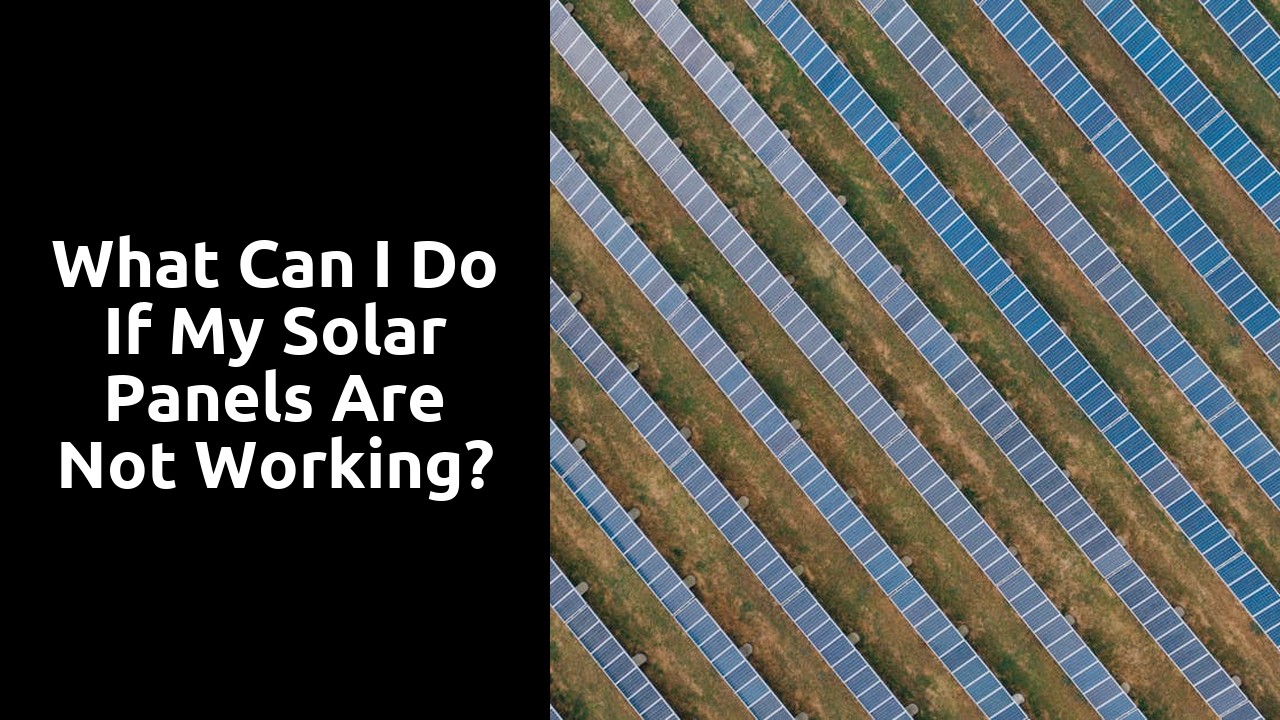
Table Of Contents
Optimising Solar Panel Efficiency for Better Performance
To ensure optimal performance of your solar panels, regular maintenance and upkeep are essential. Cleaning the solar panels regularly is a simple yet effective way to boost their efficiency. Dust, debris, and bird droppings can accumulate on the panels, blocking sunlight and reducing their ability to generate electricity. By regularly cleaning the panels with a soft brush and water, you can maximise their exposure to sunlight and improve their overall performance.
In addition to regular cleaning, monitoring the performance of your solar panel system is crucial for detecting any issues early on. Keep track of your system's daily energy production to identify any sudden drops in output. If you notice a significant decrease in performance, it may be a sign that your panels require maintenance or repair. Addressing these issues promptly can help prevent more serious problems down the line and ensure that your solar panel system continues to operate efficiently.
Implementing Shading Solutions for Maximum Sunlight Exposure
When considering ways to improve the performance of your solar panel system, one crucial aspect to address is the level of sunlight exposure your panels receive. If your solar panels are not producing as much energy as expected, shading could be a key factor inhibiting their efficiency. To maximise sunlight exposure, it is essential to strategically trim trees or bushes that may cast shadows on your panels during peak sunlight hours. Additionally, installing systems like solar trackers can help adjust the angle of your panels throughout the day to ensure optimal sunlight absorption. By taking proactive measures to mitigate shading issues, you can enhance the productivity of your solar panel system and reduce the need for extensive Solar Panel System Repair.
Another effective strategy for improving sunlight exposure to your solar panels is to assess the positioning of nearby structures and consider utilising reflective surfaces to redirect sunlight onto your panels. Reflective surfaces like white roofing materials or mirrors strategically placed can help bounce sunlight onto your panels and increase their energy output. Moreover, ensuring that there are no obstructions such as debris or bird droppings on the panels themselves is essential for maximising sunlight exposure. By implementing these shading solutions and adopting maintenance practices to keep your panels clean and unobstructed, you can enhance the efficiency of your solar panel system and minimise the need for future Solar Panel System Repair.
Safety Precautions When Dealing with Solar Panel Troubleshooting
When encountering issues with your solar panels, it is important to take certain safety precautions before attempting any troubleshooting. Firstly, ensure that the solar panel system is switched off to prevent any electrical mishaps. This involves cutting off the power supply from both the solar panels and the connected battery or inverter. It is crucial to exercise caution and wear appropriate safety gear, such as insulated gloves and goggles, when dealing with any potential Solar Panel System Repair.
Before embarking on any repair work, ensure that you have a thorough understanding of the solar panel system and its components. Familiarise yourself with the layout of the solar panels, wiring connections, and any associated equipment to prevent accidental damage or injury. If you are unsure about any aspect of the troubleshooting process, it is advisable to consult a professional solar panel technician to avoid any further complications in the Solar Panel System Repair.
Turning Off the Solar Panel System Safely
When encountering issues with your solar panels, it's crucial to know how to turn off the solar panel system safely before attempting any repairs. To start the process, locate the main switch or breaker that controls the power supply to the solar panels. This switch is often found near the inverter or electrical panel of the system. Once you have identified the switch, carefully move it to the "off" position to cut off the power supply to the solar panels.
After turning off the solar panel system, it is advisable to wait for a few minutes to ensure that all electrical components have fully shut down. This waiting period will decrease the risk of electrical shocks or damage during Solar Panel System Repair. Remember to always use precautionary measures such as wearing insulated gloves and avoiding contact with any exposed wires. Turning off the solar panel system safely is an essential step in addressing system malfunctions effectively and without any incidents.
Evaluating the Age and Condition of Solar Panels
When it comes to evaluating the age and condition of your solar panels, it is essential to start by inspecting the physical state of the panels. Look for any signs of wear and tear such as cracks, discolouration, or warping. These factors can indicate the overall health of your solar panel system. Additionally, check for any loose connections or damaged wiring that may be affecting the efficiency of the panels. Identifying these issues early on can help prevent further damage and ensure optimal performance of your solar panel system.
Regular maintenance and monitoring of your solar panels are crucial in determining their age and condition. Keep track of the energy output of your system and compare it to when it was first installed. A decrease in energy production could signal that your panels are aging and may require maintenance or repairs. If you notice a significant drop in performance, it is advisable to seek professional assistance for Solar Panel System Repair to address any underlying issues and restore your system to its full capacity.
Considering Upgrading Older Solar Panel Systems
If your solar panels are aging or not functioning optimally, it might be time to consider upgrading your older solar panel system. The efficiency of solar panels tends to decrease over time due to wear and tear, as well as advancements in technology that make newer models more efficient. Upgrading your solar panels can significantly improve the overall performance and energy output of your system, ensuring that you get the most out of your investment in renewable energy.
When contemplating upgrading your older solar panel system, it's important to consult with a reputable solar panel provider to assess your current setup and determine the best course of action for improvement. They can offer valuable insights on the latest technologies and models available, as well as provide cost-effective solutions that align with your energy needs and budget. By investing in the upgrade of your solar panel system, you can enjoy enhanced energy efficiency, reduced maintenance costs, and a more sustainable energy source for years to come. Additionally, upgrading can also potentially prevent the need for frequent Solar Panel System Repair, thus saving you time and money in the long run.
FAQS
How do I know if my solar panels are not working?
You can check for signs such as a significant decrease in energy production, unusual noises, or warning lights on the inverter.
What should I do if my solar panels are not generating enough electricity?
Try cleaning the solar panels, removing any shading obstructions, or contacting a professional for troubleshooting and repairs.
Is it safe to troubleshoot solar panels on my own?
It is recommended to follow safety precautions and turn off the system before attempting any troubleshooting. If unsure, consult a qualified technician.
How can I improve the efficiency of my solar panels?
You can optimize solar panel efficiency by regularly cleaning them, ensuring proper sunlight exposure, and considering upgrading to newer, more efficient panels.
What should I do if my solar panels are old and not performing well?
If your solar panels are aging and underperforming, it may be time to evaluate their condition and consider upgrading to newer, more efficient panels for better performance.
